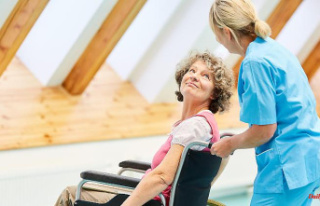If less gas comes from Russia, heating will become more expensive and possibly more difficult. From a health point of view, cooler apartments are not a problem even at lower temperatures - on the contrary.
With summer temperatures, Germany is discussing the prospect of cooler homes in winter. Because it is not clear how gas deliveries from Russia will continue, there is a proposal that rented apartments should stay a little colder in the future. If you feel perfectly comfortable at 30 degrees, the prospect of less than 20 degrees in the living room should send a shiver down your spine. But what temperature is healthy?
The Federal Environment Agency (UBA) has long been advising Germans to keep the indoor temperatures cooler: "The room temperature in the living area should not be more than 20 degrees Celsius," says the UBA. The UBA recommends 18 degrees in the kitchen and 17 degrees in the bedroom, but limits: "In all cases, the individual comfort temperature is decisive." "The temperature that we subjectively perceive as pleasant is almost always higher than what is good and healthy," says Prof. Stephan Vavricka, specialist in internal medicine at the Center for Gastroenterology and Hepatology in Zurich.
It's not a bad thing to be a little cold, on the contrary: "Actually, it would be healthy if we shivered from the cold every day, because it breaks down fatty tissue." According to Vavricka, the fact that one shivers at 25 degrees and the other sweats at 20 degrees is due to the different thermogenesis. This is the ability to produce heat itself. It is created as a by-product of metabolic processes, such as digestion or muscle activity. As a general rule, fat people could produce heat more easily than thin ones, says Vavricka. Therefore, they are usually less sensitive to cold.
But the perception of temperature varies, as Leonard Fraunberger from the University of Erlangen-Nuremberg explains. He is a specialist in internal medicine and Vice President of the Bavarian Association of Sports Physicians. What sounds like a cliché has been scientifically proven: women freeze more often than men. Because whether you're cold or not depends primarily on muscle mass: "More muscles produce more heat."
One pulls the blanket over himself on the sofa, the other takes off his sweater - according to Fraunberger, this is also due to factors that you have in your own hands. For example, whether you slept well, ate enough and exercised enough has a major influence. "From a medical point of view, a lower room temperature would be good for many people," says internist and sports physician Fraunberger: It could motivate people to exercise more and eat healthier. "You kill two birds with one stone: You do something for the climate and for your immune system, because regular exercise strengthens the immune system."
The optimal outside temperature for top athletic performance of the body is below 20 degrees, as the sports doctor explains. When it is cooler, the blood vessels to the extremities narrow and the body emits less heat. "On the other hand, the processes no longer run optimally at temperatures of more than 30 degrees." Fraunberger and Vavricka believe that we usually find higher temperatures more pleasant as a matter of habit. In Italy there is hardly any heating, in England it runs through every crack - every traveler can think of examples.
The individual "comfort corridor" can be moved up or down at any time, says Fraunberger. However, if you are used to 25 degrees in the living room, you should not immediately switch to 15, but gradually regulate the heating down by one degree. The German Weather Service not only predicts the temperature, but also indicates the "felt temperature". It is influenced, among other things, by the radiation from the sun, the strength of the wind and the humidity of the air, as Andreas Matzarakis from the Center for Medical Meteorological Research of the DWD explains: "There are up to 70 factors that influence our thermal perception."
In addition to tiredness and hunger, stress and illness are also part of it, explains the medical meteorologist. "26 degrees is the temperature at which people use the least energy," says the medical meteorologist. Nevertheless, the DWD also advises cooler room temperatures - also for reasons of climate protection. "With every degree that I lower the room temperature, I save six percent of energy," calculates Matzarakis.
Climate change is causing us to have a problem cooling homes in the summer, and the looming energy crisis may bring us cooler winters at home - "but both are linked". With one difference: In contrast to heat stress in summer, it is easier to do something about freezing in winter. Sports doctor Fraunberger recommends "just walking around the block, then the apartment will seem much warmer". Internist Vavricka advises "putting on one more layer". If you want to do something good for your health, you can also do push-ups in front of the TV.












